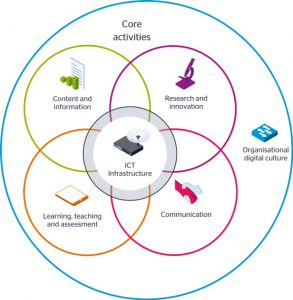New and updated resources in this post:
- Developing digital capability: an organisational framework
- Digital capability case studies: synthesis report
- Developing digital capability in your organisation: briefing paper
- Developing digital capability in your organisation: poster.
In 2009/10, through its Learning Literacies for a Digital Age (LLiDA) project, Jisc first flew a flag for what has become ‘digital capabilities’ today. That project focused on the skills and mindset needed to become a digitally capable learner. It concluded that there is no one way of being digitally literate. Instead there are a number of interlocking practices that individuals express differently depending on their settings, on the aspirations they have, and on the opportunities and constraints they experience.
LLiDA prepared the ground for the more ambitious Developing Digital Literacies (DDL) programme. Twelve universities and colleges were supported to put in place different strategic approaches, and together they explored what difference they could make to staff and student digital practices over a two-year period. Once again, DDL showed that there was not one ‘right’ way of doing development around a digital capabilities agenda. What one university or college needs to succeed and what its opportunities are for development are not the same as for the university or college down the road. Jisc also worked alongside a wide range of professional bodies to consider how digital technologies were changing practice across educational roles.
Since those projects reported we have seen the launch of the UCISA Digital capabilities survey (more on this in a following post), been through several iterations of the FELTAG agenda, and responded to the QAA Higher Education Review theme. Digital literacy, or capability (or fluency, or confidence, or skills) have become a mainstream concern for strategies and organisational leaders to address. Digital technologies have continued to reshape organisations – for example by enabling the collection and analysis of learning data, by opening up new kinds of student market, and by unbundling roles and functions. No-one who works in education has been untouched by these effects.

This is why I feel it’s important not to focus on people’s digital capabilities without considering the organisation they study or work in. Tools such as the Digital capabilities (‘six element’) framework and the profiles might help individuals to identify skills they have that are valuable in their work, or to consider what areas they would like to develop further. But the responsibility for development has to be shared. We know from those earlier projects, for example, that the digital environment and infrastructure play an important role. People are more likely to develop advanced skills if they have access to a personal device and web services, robust classroom technologies and connectivity, specialist software, and rich digital media to hand.
Individuals also need support to keep acquiring and updating their skills. Online, just-in-time materials are fine for those who have some confidence, but fall down when people are anxious about their basic skills, or are trying to master complex and challenging practices. Time and freedom to experiment, especially with peer support, are necessary for deep, embedded learning. More important still are credible forms of recognition and reward.
What is Jisc doing to help organisations?
Developing digital capability: an organisational framework is a new resource, covering the six elements from an organisational perspective. It looks at what enables individuals to thrive and develop in their digital practice. It is designed to be used by digital leaders and change agents in whatever roles they are working.
From a highly practical point of view, the Digital capability case studies synthesis report describes what 15 organisations are doing to support digital capability and what they find works for them. It is a taster for the case studies themselves, which we will be launching tomorrow alongside our session on the same theme at Digifest.
We are also launching a brand new Guide: Developing organisational approaches to digital capability. Clare Killen will be blogging about the Guide at its launch, but you can catch a preview right now in this Briefing paper and Poster.
Follow #digitalcapability for updates over the next days and weeks, and beyond.
